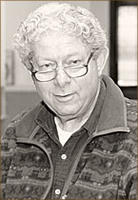
Bernard Lemonick's late brother and another first cousin that my mother never got to know.
Dr. Aaron Lemonick C’50, Princeton, N.J., professor emeritus of physics and former dean of the Graduate School and dean of the faculty of Princeton University; June 19, 2003. “I never did ‘decide’ to be a teacher,” he said in a 1972 interview. “In my senior year it just became clear that that’s what I was!” He began his career in higher education as an assistant professor of physics at Haverford College, where he taught for seven years and chaired the physics department for four. In 1961 he returned to Princeton (his graduate alma mater) as associate professor of physics and associate director of the Princeton-Penn Accelerator, where he was in charge of the research program. He became professor of physics in 1964. He served as dean of the Graduate School from 1968 to 1973 and dean of the faculty from 1973 to 1989. As dean of the Graduate School, he initiated imaginative new efforts to recruit graduate students from previously underrepresented populations, especially African Americans. After 21 years in administration he returned to the physics department in 1989. In 1990 Dr. Lemonick joined the Princeton Plasma Physics Laboratory as deputy director for administrative operations. At his retirement in 1994, Princeton awarded him its President’s Award for Distinguished Teaching, being cited as a “master teacher” who was able to “make difficult concepts obvious and the most routine problems adventures in understanding.” In a letter to Dr. Lemonick a former student wrote, “If your goal as a teacher is to be remembered by your students as caring, approachable, and involved, you have more than succeeded … Thank you for being what a teacher should be. I feel lucky to have been in your class.” Dr. Lemonick returned to Princeton to teach freshman physics labs and served as director of the Quest program, a summer science seminary for local elementary school teachers. He was associated with the Princeton University Press for 30 years, serving as vice president of the board and chair of the executive committee. And he participated for several summers in the Latin American Institutes for Physics Teachers, instructing teachers in South America. In 2001 Princeton awarded him an honorary Doctor of Science degree. During World War II he served in the U.S. Army Air Corps, where he was General Mark Clark’s radio operator in the North Africa campaign.






No comments:
Post a Comment